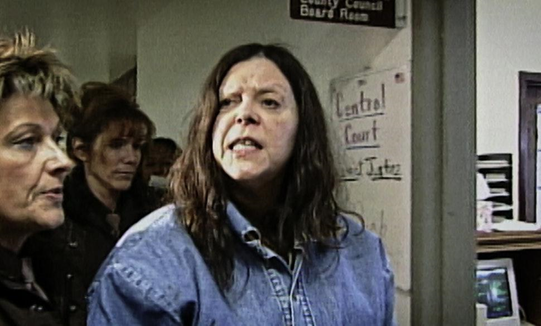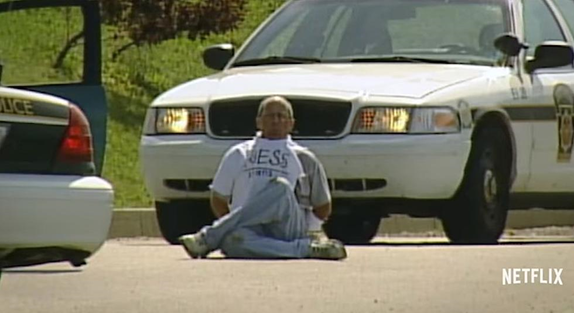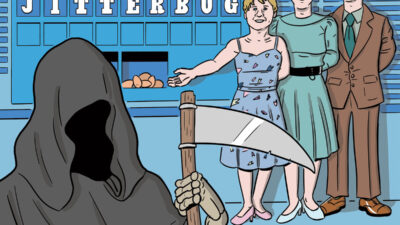This article previously appeared on Crossfader
It’s unquestionable that the true crime behind EVIL GENIUS is mortifying. Few cases are quite this harrowing, both deeply depressing and diabolical all at once. It’s kind of like a sequence from SAW, parsed out into some maniacal multi-crime. Looking at it as a filmmaker, my only real problem with EVIL GENIUS is that it’s lazy in its storytelling. It’s not reinventing the wheel for the true crime format, and since Netflix has become the bearer of non-fiction grime, I expected a little more. I appreciate condensing the story into a brisk four episodes (MAKING A MURDERER was too much of an epic for my taste), but it never reaches the dramatic heights of THE JINX, despite the fact that its subject in question gets deeply involved with the filmmakers. What does bother me is the way I’m starting to see these shows from a humanistic perspective. With EVIL GENIUS, I think we may have crossed an ethical line, because frankly, I see no purpose for its existence.
I’m starting to realize that the true crime mini-series really only takes one of two avenues: trying to vindicate innocent people, or trying to analyze psychopathic ones. Both formats have their own perks. One takes on the enormous responsibility of doing the heavy lifting that the justice system couldn’t handle. The other tries to understand what drives individuals to misconduct—modern cautionary fables for friends and family. When done well, these shows can highlight gaping holes in the American legal system. When done poorly, they’re little more than adrenaline kicks, a brief glimpse into a world of insanity. What’s rather peculiar is how ingrained these documentaries have become in modern culture, and I’d be remiss not to say that society’s infatuation with these criminals is troubling.
21st century America is a nation plagued with mental illness, school shootings, and questionable upbringings. From secluded American communities to cookie cutter suburbs to overmedicating the young and the old, there’s something eerily deafening about middle class angst—a desaturated state of perpetual boredom. While the United States certainly faces countless sociopolitical issues across the board, it’s the PLEASANTVILLE sameness of America that creeps me out most as a foreigner. Identity feels thrown at the wind in these small towns, every strip mall and chain restaurant a replica from the neighboring state. When children grow up in these neighborhoods, with access to nothing but their internet connection, I wonder if it’s acceptable that shows like EVIL GENIUS can be accessed by anyone of any age—so long as they have that Netflix subscription.

And let’s face it, not like anyone is giving up on STRANGER THINGS now . . .
I’m not saying this is a new phenomena either; I distinctly remember the overflow of true crime documentaries on late night American television whenever I’d flip through channels on my hotel TV in the early aughts. But there was something distinctly lame about the likes of FORENSIC FILES. Netflix, somehow, beyond all odds, has made them cool (right alongside THE JINX and SERIAL). Let me go on record that I’d never go as far as to blame school shootings on media—I’m an avid gamer myself, after all. But what is the ethical line when it comes to recording criminal activity? It’s one thing to direct BOWLING FOR COLUMBINE and UNDER THE GUN in an attempt to raise community awareness. It’s another to release a four-part documentary series that does nothing but put a psychopath in the spotlight.
EVIL GENIUS is undeniably compelling. Rarely do we get a glimpse into the psyche of a bipolar murderer, but should we really be giving these people the time of day? Doesn’t highlighting these cases on the homepage of Netflix entirely validate the reason why they commit crimes of this ilk? At what point do we reconcile the fact that, yes, violent media doesn’t make children killers, but turning criminals into tabloid sensations might. I deeply respect the journalistic wherewithal of documentarians like Barbara Schroeder and Trey Borzillieri, but when Netflix has gotten to the point that we can see an innocent man suffer a fatal injury from having a bomb strapped around his neck, I can’t help but feel that the true crime format is bringing us further from journalism and closer to exploitation.

I don’t mean to be THAT guy, but “think of the children!”
Maybe I’m crazy for saying this, but should dinner conversations and public attention go to serial killers? I don’t actually have an ethical problem with narrative exports the likes of ZODIAC and MEMORIES OF MURDER. Films that dramatize killings with actors years after they happened (from the Manson murders to the Washington sniper) are an inevitability in a world obsessed with “it could happen to you” storytelling. But the true crime documentary hands the megaphone right back to the culprit. Marjorie Diehl-Armstrong was a despicable, pathetic woman who committed a litany of unforgivable crimes. By all means, she deserved to rot in jail with no outside communication. The fact that a documentarian entertained her charade until her death upsets me. It proves that you can commit a disgusting crime, become the talk of the town, and still believe that someone is actively working to support your narrative until your death—after all, Diehl-Armstrong believed Borzillieri was on her team until her last breath. Its okay to report on criminals, it’s wrong to hand them the microphone while incarcerated.
It’s a challenging tightrope walk, especially because Borzillieri’s final mission is a noble one: clearing the name of an innocent man who—up until the release of the documentary—was considered a co-conspirator of a botched bank robbery. I understand that any measures taken to honor the dead can be justified, but I can’t help but put myself in the shoes of two people when watching EVIL GENIUS. First off, the shoes of the deceased: would Brian Wells want the world to see his death broadcast on streaming services? I don’t know. Would Brian Wells want a documentary to dedicate so much of its time to spotlighting his murderer? I struggle to think he would. Secondly, I put myself in the shoes of an impressionable teen, someone teetering on the edge of a nervous breakdown. I can’t claim to understand the psychology of young criminals, but if your heinous moment of fame can be immortalized in the clouds of Netflix, then that just might be your final motivator. Media doesn’t make us violent, but interviewing and entertaining criminals behind bars gives them the exact attention they so dearly seek.
















Comments